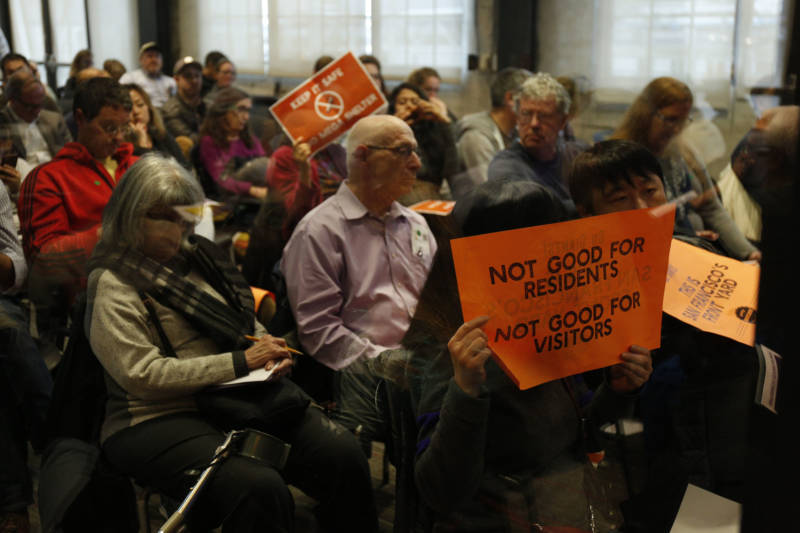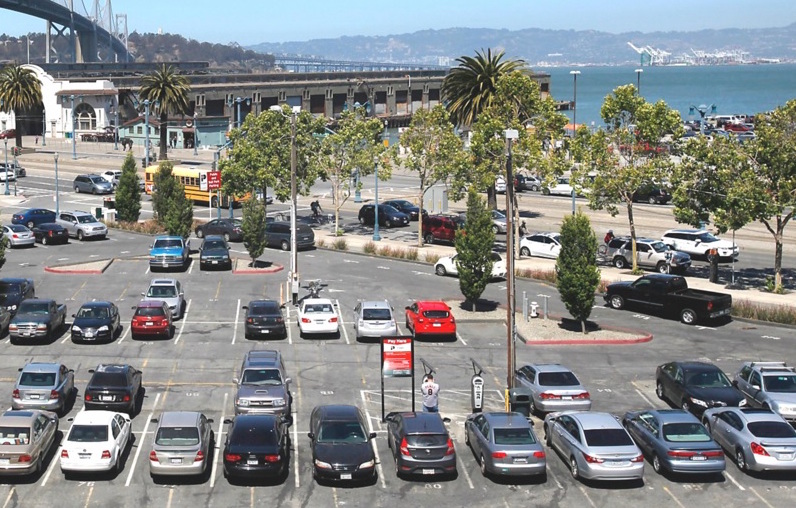A lawyer for opponents of a planned multiservice homeless shelter on San Francisco’s Embarcadero said Friday the city was “taking a big risk” by beginning to prepare the site for construction before a judge has ruled on a temporary restraining order that would halt the navigation center.
Opponents of Navigation Center Say City Taking 'Big Risk' in Starting to Prep Site

San Francisco Public Works put up fencing around the site on July 1, said spokeswoman Rachel Gordon. A contractor has surveyed the property and brought in construction equipment, trailers and portable toilets.
“We are moving forward with the project,” she said, noting that San Francisco Public Works is the project manager and a contractor has been hired to do the work. “At this time, the contractor is still working on site preparation.”
On Wednesday, a group of residents who live near the proposed site filed a lawsuit alleging that the city of San Francisco violated California law by not seeking permission from the State Lands Commission before deciding to develop the property.
Next Thursday, Sacramento County Superior Court Judge James P. Arguelles will hear arguments over the temporary restraining order, as well as consider a request by the city to have the lawsuit heard in San Francisco.
“I think they’re taking a big risk,” said Peter Prows, an attorney for the neighborhood group, Safe Embarcadero for All. “The judge could shut them down.”
The San Francisco Port Commission in late April approved leasing the 2.3-acre lot to the city to build the Embarcadero SAFE Navigation Center, a 200-bed facility that would provide a range of round-the-clock supportive housing and rehabilitative services to the homeless.
Safe Embarcadero for All then appealed to the San Francisco Board of Supervisors under the California Environmental Quality Act (CEQA), objecting to an exemption from environmental review issued by the city’s Planning Department. The board, however, rejected that appeal in June.
Wallace Lee, a member of the group and stay-at-home dad who lives two blocks from the proposed site, said he saw the fencing go up on July 1. That’s when he realized, “It’s coming … It seemed more realistic.”
“The whole process has been discouraging,” he said. “It feels like the city didn’t address our concerns or seriously listen.”
The proposed navigation center, which would be located at the end of Bryant Street, is a critical part of Mayor London Breed’s campaign pledge to open 1,000 new shelter beds by the end of 2020.
The San Francisco City Attorney’s Office said it was reviewing the lawsuit and would address the allegations in court.

Prows said a key legal argument will center on the land, which was state property until the late 1960s — when the state granted it to the city in trust for public use.
As one of the grant conditions, Prows said, the state told the city that if it wanted to “lease this property for non-trust uses — which is what housing is — it’s got to be for a maximum profit that would then get reinvested into harbor works or fisheries or other sorts of traditional public trust uses.”
The city would also have to get approval from the State Lands Commission, which has ultimate responsibility for public trust property in the state, and would have to prove it was getting fair market value for the site, Prows added.
“I think the city probably realized it couldn’t get the commission’s approval,” he said.
The State Lands Commission declined to comment, citing the pending litigation.
John Coté, a spokesman for the city attorney’s office, said the project had undergone all of the required environmental reviews, and appropriate land use laws were followed.
“San Francisco has a homeless crisis on its hands. The City is ready to put roofs over people’s heads and get them indoors,” he said Thursday in an email. “Others are filing baseless lawsuits to keep people out in the cold. Rather than trying to shift the problem to someone else’s backyard, everyone needs to do their part.”
After the board’s vote in June to move forward with the project, Breed, who proposed the center in March, said the city planned to break ground later this summer — with hopes of opening it by year’s end.
San Francisco opened its first navigation center in 2015 and currently operates six throughout the city. Unlike traditional shelters, the centers allow occupants to bring their pets and don’t require them to leave in the morning.
The Embarcadero navigation center, which would be the city’s largest, elicited a succession of heated and sometimes vitriolic community meetings about the project, attended by staunch advocates for and against the plan. The strongest pushback comes from residents of the South Beach, Rincon Hill and Mission Bay neighborhoods, amid concerns that the facility would transform the tourist-heavy neighborhood into a dirty, crime-ridden area and reduce property values.
The city is leasing the port-owned land for two years for nearly $37,000 a month, and will have the option of renewing for an additional two years if it can show the center has helped reduce homelessness. The port said it still plans to later develop the prime piece of real estate — Seawall Lot 330 — for longer-term, more profitable use.
